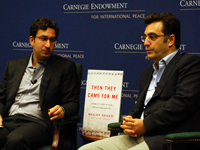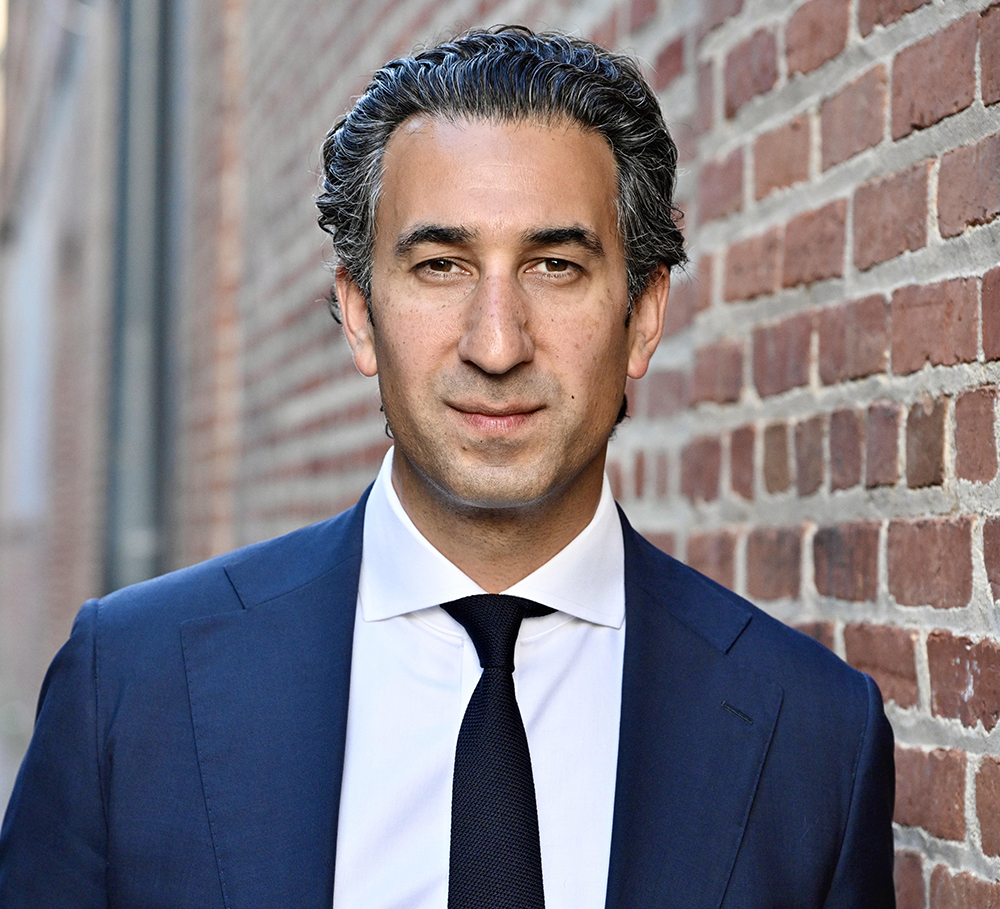{
"authors": [
"Maziar Bahari",
"Karim Sadjadpour"
],
"type": "event",
"centerAffiliationAll": "dc",
"centers": [
"Carnegie Endowment for International Peace"
],
"collections": [],
"englishNewsletterAll": "menaTransitions",
"nonEnglishNewsletterAll": "",
"primaryCenter": "Carnegie Endowment for International Peace",
"programAffiliation": "MEP",
"programs": [
"Middle East"
],
"projects": [],
"regions": [
"Middle East",
"Iran"
],
"topics": [
"Political Reform"
]
}
Book Discussion with Iranian Journalist Maziar Bahari
Mon, June 13th, 2011
Washington, D.C.
Iran remains deeply shaken on the second anniversary of Iran’s controversial June 2009 presidential elections. The Iranian regime continues to live in fear of internal subversion while reformist activists are struggling to chart a path forward amidst deaths, imprisonment, and heavy repression.
Acclaimed Iranian journalist and documentary filmmaker Maziar Bahari presented his new book, co-authored with Aimee Molloy, Then They Came for Me: A Family's Story of Love, Captivity, and Survival, at an event at Carnegie. The book chronicles Bahari’s experience in solitary confinement in Tehran’s notorious Evin prison—enduring physical and psychological torture—on trumped-up charges of espionage in the aftermath of the contested 2009 election. Bahari also shared his thoughts on Iran’s internal dynamics amid popular uprisings throughout the Middle East. Carnegie’s Karim Sadjadpour moderated.
Surviving Prison
Bahari explained that the book was written as a response to repeated questions about how he survived 118 days in prison relatively unscathed. In the book, he describes two major sources of strength during his time in prison:
- Family: Bahari was not the first member of his family to be imprisoned for political activism. His father and sister, both communists, were imprisoned and tortured under different Iranian regimes. This is typical in Iran, Bahari said. Many families have seen multiple members imprisoned for communism, nationalism, Islamism, or other beliefs. Bahari attributed his survival in prison to a deep understanding of his family’s history and the history of Iran.
- Culture: Bahari described the difference between himself and his interrogator as stemming from a deep knowledge of culture. For example, he explained that he was able recreate films in his head when he was alone, giving him inner resources that no one could touch.
Soldiers of the Regime
Bahari explained the worldview of his interrogator and other loyal members of the current regime.
- Repressed Desires: Bahari described his interrogator as obsessed with sex, resenting both the fact that Bahari had relationships with women but also that he had spent time in the West. The interrogator’s image of the West came from his indoctrinators and from pornography, which he believed offered a realistic assessment of life in the West. Even the most seemingly pious Revolutionary Guards commander had a penchant for pornography, added a former Revolutionary Guards speechwriter from the audience.
- Israel: Bahari explained that his interrogator accused him of being an agent of Zionism because he once made a film about the Holocaust. Bahari noted that his interrogator hated Israel but was also in awe of its power; the interrogator believed the Mossad could do anything and wanted Iran to have the same power.
The Future of the Opposition
The opposition Green Movement has revived somewhat since February, but it still faces significant challenges ahead.
- Societal Support: The opposition has significant societal support, Bahari said. Even reformist activists were surprised at how many people turned out to protest the June 2009 election results. Yet Iran’s Supreme Leader, Ayatollah Khamenei, still has a large minority of supporters, as high as 30 percent of the population, who are religious and used to having a monarch, he added. This group is getting smaller and smaller, but it remains significant.
- Reaching New Actors: If the opposition is to make progress, it must reach out to three key groups: the clergy, merchants of the bazaar, and workers and farmers. Many members of the clergy are upset with government interference in religion and feel that the regime has tarnished the place of religion within society. Merchants are unhappy with the presence of intelligence services in the bazaar, and workers are dissatisfied with the economy. Yet both the clergy and merchants prefer stability to radical change, Bahari warned, and would not support a revolution.
- Leadership: The Green Movement lacks a strong leader, but that may be a good thing, Bahari argued. The absence of a leader enables the movement to be more democratic and allows an open debate about what should be done and what kind of leader people would like. However, a leader will be necessary eventually, he explained, and such a person will need to be able to communicate with various parts of society, including starting a dialogue with the regime. Iranian society is ready for a woman to lead, Bahari added, even if the regime is not.
- Impact of the Arab Spring: The Arab Spring reinvigorated the opposition movement, Bahari said, and ended a year without street protests. The Iranian regime is very nervous, and recent splits between President Mahmoud Ahmadinejad and Khamenei may be a sign that Ahmadinejad is trying to distance himself from Khamenei’s sinking ship, he added.
Prospects for National Reconciliation
Bahari expressed his desire for a peaceful and gradual transition away from authoritarian rule in Iran and warned against continuing a cycle of violence.
- Moving Beyond Hate: Bahari explained that he did not demonize the current regime or even his interrogator during his time in prison. Calling an individual or a regime monstrous gives them an implied power, he explained. It is better to regard them as flawed individuals in a bad system.
- Negotiating with the Regime: Some negotiation with the current system will be necessary, Bahari argued, because it is not possible to get rid of everyone associated with the Islamic regime without continuing the cycle of violence and retribution. Some people within the government are honest technocrats who could serve in future governments, and the opposition should open a dialogue with them. Yet human rights violators should be prosecuted, Bahari concluded, adding that no dialogue is possible with Khamenei, because he has betrayed the people’s trust.
Carnegie does not take institutional positions on public policy issues; the views represented herein are those of the author(s) and do not necessarily reflect the views of Carnegie, its staff, or its trustees.
